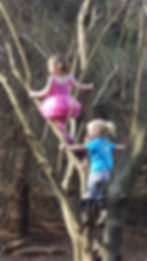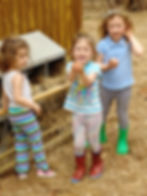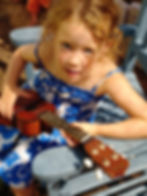The mission of the Wildflower School is to grow a community in which children work and play as competent citizens with rights, families join with students and teachers in creating a healthy and joyful school environment, and educators are actively supported in their professional and intellectual explorations.

Since 2016, Wildflower School has created community with families throughout Orange, Durham and Chatham counties. Our school is inspired by the forest school and Reggio Emilia approach to education. However, these philosophies do not inform the essence of Wildflower.
The soul of Wildflower is found in its commitment to teaching children relational skills (how to be in relationships with others), and emotional regulation and distress tolerance skills. Research shows that without the ability to collaborate, cooperate, calm down an angry whoosh or sit with uncomfortable feelings/insistent urges, individuals likely will not reach their full potential. There are a plethora of articles, blogs and scientific research papers illuminating the connection between academic performance and emotion regulation.

.jpg)

In short, because Wildflower is committed to helping children develop their social and emotional skills, we chose a forest school, Reggio Emilia-inspired approach. We believe these two educational philosophies best support children as they navigate the early years. Research is solid that time spent in nature supports mental health and well-being. Similarly, the Reggio Emilia approach values the importance of relationships and fosters relationships early to provide a foundation for children to create a joyful life. The combination of the forest and Reggio approaches is ideal for creating an environment where children thrive both intellectually as well as emotionally. This combination is absolutely essential for human development.
Knowing the alphabet is great, but if a child can't develop authentic friendships, practice empathy for self and others, practice learning from peers and using her imagination to resolve challenges creatively, knowing the alphabet really won't matter very much. Early knowledge of the alphabet certainly does not increase a child's sense of well-being.
Wildflower deeply values children's competence and ability to learn. We recognize that children's play is their serious work. We do not subscribe the belief that earlier is inherently better but believe that supporting children's natural interest in traditional learning inquiries (reading, math, etc) is the most effective means of inspiring intellectual curiosity. We follow the research every step along our learning journey with children.
Wildflower stands apart from other forest schools because we prioritize supporting children as they learn the social and emotional skills they need to love themselves and others fully and joyfully. Children do not spontaneously develop tools for living - these tools are thoughtfully taught. When these skill-building experiences are not intentionally and consistently offered to them by adults adept at practicing and teaching these skills, children are unable to effectively navigate relationships, conflict, and strong emotions. Wildflower places emotional intelligence and intellectual curiosity above academics and other learning objectives. We believe that academic learning is best built on a foundation of self-awareness, self-regulation, a sense of safety and trust in the world, empathy and relational skills.
Give your child the head start that really matters. Give them a Wildflower education.



Quick facts about Wildflower
Our school week is Monday-Friday.
Our preschool hours are 8:30am-12:30pm.
We accept students ages 2-6.
Wildflower is not a licensed school, as NC does not currently offer licensing for forest schools. However, the Early Childhood Division of NCDHHS is exploring licensing options for forest schools. For more information, contact NCDHHS.
FAQ
We do not require toilet training in our preschool program.
"The wider the range of possibilities we offer children, the more intense will be their motivations and the richer their experiences. We must widen the range of topics and goals, the types of situations we offer and their degree of structure, the kinds and combinations of resources and materials, and the possible interactions with things, peers, and adults."
-Loris Malaguzzi












